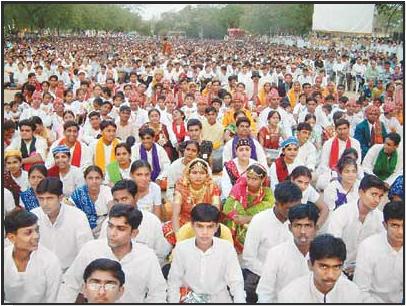"Bhavlakshi" from Swadhyay pariwar Celebrate Sanvatotsav at Bhavnirzar
"Bhav Nirzar" is an educational institution located in Ahmedabad, founded by Pujya Pandurang Shastri (Dadaji). Within the institution, there is a prayer hall containing life-size idols of Lord Yogeshwar, Lord Shiva, Goddess Parvati, Lord Ganesh, and a Shivlinga. Every year, a pious occasion known as Sanvatotsav is celebrated at Bhav Nirzar. This event marks the anniversary of the sanctification of all the afore-mentioned idols with the prescribed Vedic rites. These holy rituals symbolize the spiritual process by which God is called to reside within the idols, transforming them from mere stone idols into a physical embodiment of God Himself.
Each year, the privilege, opportunity, and responsibility of conducting the Sanvatotsav celebration is given to a different group within the Swadhyay Pariwar. This year, the festive occasion, held on April 11, 2006, was organized, attended, and performed by more than 75,000 "Bhavlakshi" people (the so-called 'Untouchables or 'Harijans') in the presence of Pujya Didiji and thousands of others.

The problem of inequality between "untouchables" and others continues to plague society, despite governmental laws and attempts at social reform. Consequently, this event is both revolutionary and history-making. To this day, most non-Swadhyay temples continue to forbid entry to the Bhavlakshi people. And in villages, the oppression and injustice is even more severe.
At a very young age, Pujya Dada noticed this oppressive treatment and injustice towards the "untouchables", and he vowed to eradicate such inhumanity from society. Over the course of the last few decades, Pujya Dada, through the Swadhyay activity, has brought about the awareness of the indwelling God residing in every human being Through the practical application of this powerful Vedic thought, he has been successful in creating a "divine brotherhood" amongst people from all walks of life. By generating an understanding of this spiritual connection in people of all castes, creeds, religions, and nations, he has created a universal family of millions united under the Fatherhood of God. Consequently, the elite section of society has embraced the "untouchables", treating them as their own brothers.
Years ago, a three-day seminar attended by hundreds of Bhavlakshis was held in Bhav Nirzar. During this time, the Swadhyayees of Ahmedabad opened their hearts and homes to the Bhavlakshis. These Bhavlakshis slept in their hosts' beds and dined using their hosts' utensils without any feelings of difference or inequality. They affectionately hugged and lovingly talked about our rich heritage and the cultural greatness of our sages and rushis. They sincerely felt that they belonged to this great culture, and that they were part of its great inheritance.
In the recent years and months prior to the occasion of Samvatotsav, thousands of Kshatriyas and other Swadhyayees regularly visited the homes of the Bhavlakshis in the villages and cities to create the awareness of an indwelling God and divine brotherhood.
One Kshatriya leader even invited a Bhavlakshi family to a marriage in his family. The Bhavlakshi family came with their own eating utensils. The Kshatriya host asked them to return their utensils to their home and told them that they would dine with the other people as equals. The Bhavlakshi family leader said, "Your relatives and your caste will not accept this, and your relations with them will be jeopardized due to us." The Kshatriya leader answered. "My sincerity to Dadaji's thoughts is being tested, and I must remain faithful to Dadaji. My relatives and caste people will have to understand and accept this."
Gradually, the acceptance of these Bhavlakshis started growing, both in villages as well as cities, and more and more Bhavlakshi societies experienced feelings of a divine brotherhood with millions of other Swadhyayees. As a part of this transformation, Didiji elevated them to a great new divine plane and honoured them with the responsibility of performing the poojan of Lord Yogeshwar in Bhav Nirzar during Sanvatotsav. This feat of Didiji has dissolved all the differences and ill-will between the Bhavlakshis and others. It also signifies the depth of transformation that has penetrated into Swadhyay society. This magnificent change has been brought about by the great efforts of Swadhyayees. But it is important to understand the role of Swadhyayees in this social reform. They have not acted as social reformers. They have worked tirelessly as devotees of Lord Yogeshwar. Therefore, their role was that of devotees and instruments of the Lord and not of social reformers. The reform was simply a by-product of their sincere efforts and action-based devotion.
The pooja of Lord Yogeshwar was performed by 500 representative Bhavlakshi families. These 500 families entered the "Garbhdwar" (the room in which the deities are housed) of Lord Yogeshwar and Lord Shiva as a part of this pooja. All of the members of these families had this privilege. In fact, the whole world will be surprised to learn that the pooja of Lord Yogeshwar was performed using the drinking water accumulated from the clay pots of the Bhavlakshi homes. Also, the "Prasad" was not purchased from a market; rather, it was made from accumulated jaggery, which was also brought by thousands of Bhavlakshis from their own homes. The Bhavlakshis felt completely connected to and embraced by the large Swadhyay pariwar. This is a tremendously revolutionary event in the social, religious, and philosophical history of India. It is proof that, as Dadaji says, "Devotion (Bhakti) is a social force." Surely, Dadaji must be tremendously overjoyed by this transformation.